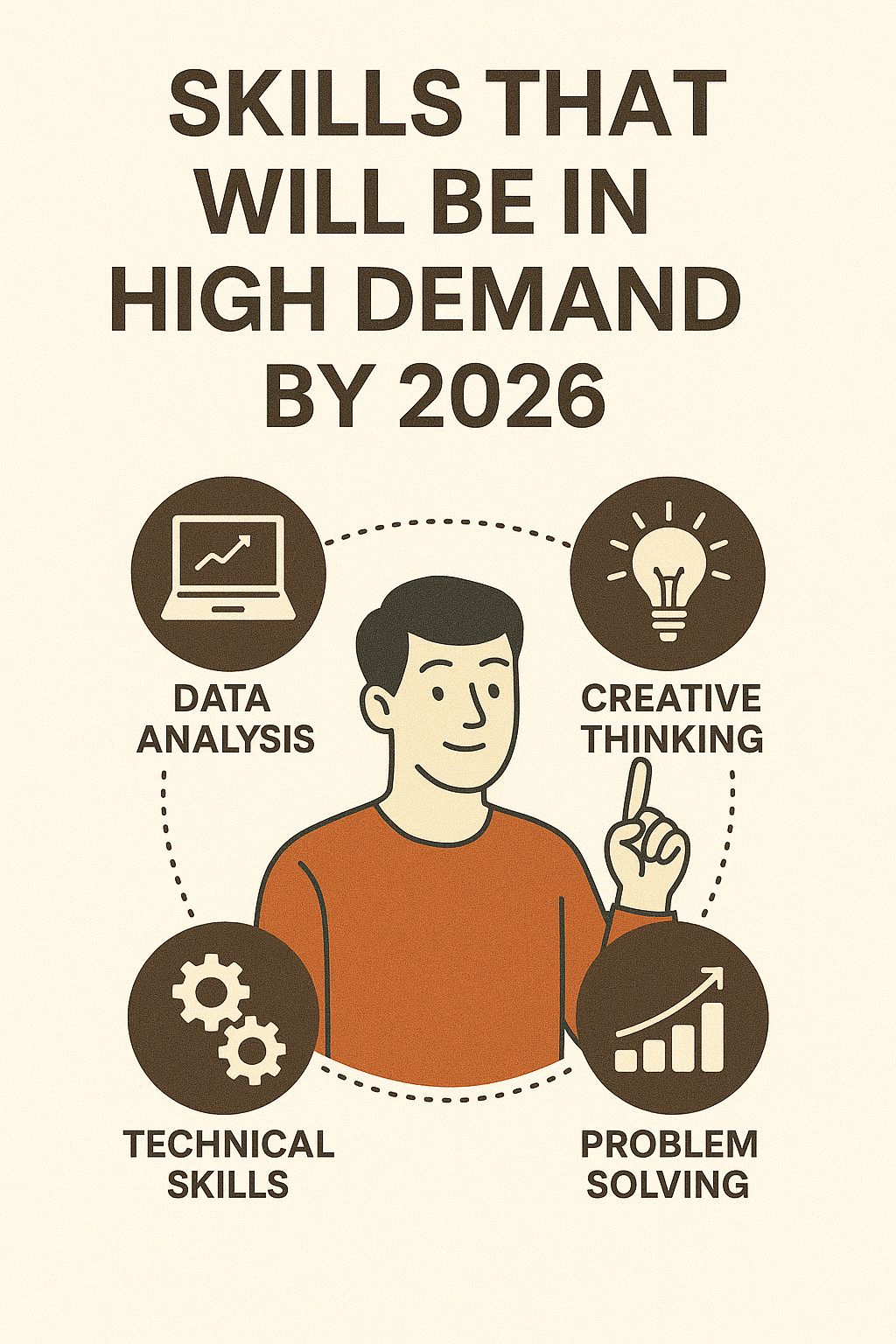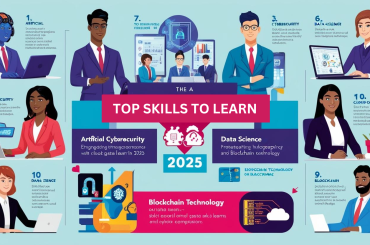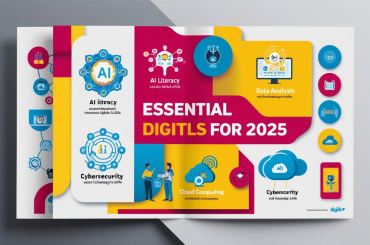Skills That Will Be in High Demand by 2026
As the world evolves at a breakneck pace, driven by technological advancements, environmental challenges, and shifting economic landscapes, the skills required to thrive in the workforce are changing rapidly. By 2026, industries will prioritize professionals who can adapt to emerging trends, leverage new technologies, and address global challenges. This article explores the top skills that will be in high demand by 2026, offering insights into how individuals and organizations can prepare for the future job market.
1. Artificial Intelligence and Machine Learning Expertise
Artificial intelligence (AI) and machine learning (ML) are no longer futuristic concepts—they’re transforming industries today. By 2026, demand for professionals skilled in AI and ML will skyrocket as businesses integrate these technologies into operations, from healthcare diagnostics to supply chain optimization.
Why It’s In Demand
- Automation and Efficiency: Companies are automating repetitive tasks, requiring experts to design and maintain AI systems.
- Data-Driven Decisions: ML algorithms analyze vast datasets to uncover insights, making expertise in this area critical.
- Innovation: AI is driving breakthroughs in fields like autonomous vehicles, natural language processing, and predictive analytics.
Key Skills to Develop
- Proficiency in programming languages like Python, R, or TensorFlow.
- Knowledge of neural networks, deep learning, and natural language processing.
- Ability to design and deploy scalable AI models.
- Understanding ethical AI development to address bias and privacy concerns.
How to Prepare
Enroll in online courses from platforms like Coursera or edX, focusing on AI and ML fundamentals. Gain hands-on experience through projects on Kaggle or GitHub. Certifications like Google’s Professional Machine Learning Engineer or Microsoft’s AI Engineer can boost credibility.
2. Cybersecurity and Data Privacy
With digital transformation accelerating, cybersecurity threats are becoming more sophisticated. By 2026, the global cybersecurity market is expected to grow significantly, creating a surge in demand for professionals who can protect sensitive data and infrastructure.
Why It’s In Demand
- Rising Cyber Threats: Ransomware, phishing, and data breaches are increasing, necessitating robust defenses.
- Regulatory Compliance: Laws like GDPR and CCPA require organizations to prioritize data privacy.
- Cloud Adoption: As businesses migrate to cloud platforms, securing these environments is critical.
Key Skills to Develop
- Expertise in threat detection, incident response, and penetration testing.
- Familiarity with frameworks like NIST and ISO 27001.
- Knowledge of encryption, secure coding, and network security.
- Understanding data privacy regulations and compliance.
How to Prepare
Pursue certifications like CISSP, CEH, or CompTIA Security+. Stay updated on emerging threats through platforms like Cybrary or TryHackMe. Practical experience in simulated cyberattack environments can hone your skills.
3. Cloud Computing and DevOps
Cloud computing has become the backbone of modern IT infrastructure. By 2026, the shift to cloud-based solutions will intensify, driving demand for professionals skilled in cloud architecture, management, and DevOps practices.
Why It’s In Demand
- Scalability and Cost Efficiency: Businesses rely on cloud platforms like AWS, Azure, and Google Cloud to scale operations.
- Agile Development: DevOps practices streamline software development and deployment.
- Hybrid Work Environments: Cloud solutions support remote collaboration and data access.
Key Skills to Develop
- Proficiency in cloud platforms (AWS, Azure, Google Cloud).
- Expertise in containerization tools like Docker and Kubernetes.
- Knowledge of CI/CD pipelines and infrastructure-as-code (IaC).
- Ability to optimize cloud performance and manage costs.
How to Prepare
Earn certifications like AWS Certified Solutions Architect or Microsoft Azure Administrator. Practice building cloud-based applications using free tiers of major cloud providers. Contribute to open-source DevOps projects to gain real-world experience.
4. Data Analysis and Visualization
Data is the new oil, and organizations are increasingly relying on data analysts to extract actionable insights. By 2026, the ability to interpret and visualize data will be a must-have skill across industries.
Why It’s In Demand
- Decision-Making: Data-driven strategies enhance business outcomes.
- Customer Insights: Analyzing consumer behavior helps tailor products and services.
- Cross-Industry Applications: From finance to healthcare, data analysis is universally valuable.
Key Skills to Develop
- Proficiency in tools like SQL, Tableau, Power BI, or Python for data manipulation.
- Ability to create compelling data visualizations and dashboards.
- Understanding statistical methods and predictive analytics.
- Strong storytelling to communicate insights effectively.
How to Prepare
Take courses on data analysis from platforms like DataCamp or Udemy. Build a portfolio of data visualization projects using real-world datasets. Certifications like Google Data Analytics Professional Certificate can add value to your resume.
5. Sustainability and Green Technology
As climate change becomes a global priority, skills in sustainability and green technology will be critical by 2026. Governments and corporations are investing heavily in eco-friendly solutions, creating opportunities for professionals in this field.
Why It’s In Demand
- Net-Zero Goals: Companies are committing to carbon neutrality, requiring expertise in sustainable practices.
- Renewable Energy: The shift to solar, wind, and other renewables demands skilled professionals.
- Regulatory Pressure: Stricter environmental regulations are driving demand for green expertise.
Key Skills to Develop
- Knowledge of renewable energy systems and energy-efficient technologies.
- Expertise in environmental impact assessment and carbon footprint analysis.
- Understanding sustainable supply chain management.
- Ability to implement ESG (Environmental, Social, Governance) frameworks.
How to Prepare
Pursue degrees or certifications in environmental science or sustainable engineering. Engage with organizations like the International Renewable Energy Agency (IRENA) for resources. Participate in sustainability-focused hackathons or projects.
6. Digital Transformation Leadership
Organizations are undergoing digital transformation to stay competitive, and leaders who can guide this process will be in high demand by 2026. This skill set combines technical knowledge with strategic vision.
Why It’s In Demand
- Business Agility: Digital transformation enables faster adaptation to market changes.
- Customer Expectations: Consumers demand seamless digital experiences.
- Innovation: Leaders who drive transformation foster innovation and growth.
Key Skills to Develop
- Ability to align technology with business goals.
- Expertise in change management and stakeholder engagement.
- Knowledge of emerging technologies like IoT, blockchain, and AI.
- Strong project management skills.
How to Prepare
Earn certifications like PMP or ITIL. Study case studies of successful digital transformations. Develop soft skills like communication and leadership through workshops or mentorship programs.
7. Healthcare and Biotechnology Skills
The healthcare sector is undergoing a revolution, fueled by advancements in biotechnology, telemedicine, and personalized medicine. By 2026, professionals with specialized skills in these areas will be highly sought after.
Why It’s In Demand
- Aging Population: Increased demand for healthcare services drives innovation.
- Precision Medicine: Advances in genomics require expertise in personalized treatments.
- Telehealth Growth: Remote healthcare delivery is expanding rapidly.
Key Skills to Develop
- Knowledge of genomics, CRISPR, and other biotechnologies.
- Expertise in telemedicine platforms and digital health tools.
- Ability to analyze health data for diagnostics and treatment planning.
- Understanding regulatory frameworks like HIPAA.
How to Prepare
Pursue degrees in biotechnology, bioinformatics, or health informatics. Gain experience through internships in healthcare startups or research labs. Stay updated on industry trends through journals like Nature Biotechnology.
8. Soft Skills: Adaptability, Collaboration, and Emotional Intelligence
While technical skills are critical, soft skills will remain indispensable by 2026. Employers value professionals who can adapt to change, collaborate effectively, and demonstrate emotional intelligence (EQ).
Why It’s In Demand
- Hybrid Work: Remote and hybrid environments require strong collaboration and communication.
- Complex Problem-Solving: Adaptability enables professionals to navigate uncertainty.
- Human-Centric Leadership: EQ fosters trust and innovation in teams.
Key Skills to Develop
- Active listening and empathetic communication.
- Ability to work in diverse, cross-functional teams.
- Resilience and adaptability to rapid change.
- Conflict resolution and negotiation skills.
How to Prepare
Enroll in leadership development programs or workshops on EQ. Practice collaboration through group projects or volunteer work. Seek feedback from peers to refine interpersonal skills.
9. Blockchain and Decentralized Technologies
Blockchain technology is expanding beyond cryptocurrencies, with applications in finance, supply chain, and healthcare. By 2026, expertise in blockchain and decentralized systems will be highly valued.
Why It’s In Demand
- Transparency and Security: Blockchain ensures tamper-proof records.
- Decentralized Finance (DeFi): Growing adoption of DeFi platforms requires skilled developers.
- Smart Contracts: Automating agreements drives efficiency.
Key Skills to Develop
- Proficiency in blockchain platforms like Ethereum or Hyperledger.
- Knowledge of smart contract development (e.g., Solidity).
- Understanding decentralized applications (dApps) and tokenomics.
- Expertise in cryptography and secure coding.
How to Prepare
Take blockchain development courses on platforms like Udemy or ConsenSys Academy. Build dApps or contribute to open-source blockchain projects. Certifications like Certified Blockchain Developer can enhance your profile.
10. Creative and Critical Thinking
In an era of automation, uniquely human skills like creativity and critical thinking will remain in demand. These skills enable professionals to solve complex problems and innovate in unpredictable environments.
Why It’s In Demand
- Innovation: Creative thinking drives product and service development.
- Problem-Solving: Critical thinking helps address multifaceted challenges.
- Human Touch: Creativity differentiates humans from AI in many tasks.
Key Skills to Develop
- Ability to generate and refine innovative ideas.
- Analytical skills to evaluate information critically.
- Design thinking for user-centric solutions.
- Storytelling to communicate ideas effectively.
How to Prepare
Engage in brainstorming exercises or design thinking workshops. Practice problem-solving through case studies or puzzles. Read widely to spark creativity and broaden perspectives.
Preparing for the Future
To stay competitive, individuals must adopt a mindset of lifelong learning. Here are actionable steps to prepare for 2026’s high-demand skills:
- Upskill Regularly: Enroll in online courses, bootcamps, or certifications to stay current.
- Build a Portfolio: Showcase your skills through projects, GitHub repositories, or professional blogs.
- Network: Join industry groups, attend conferences, and connect with professionals on platforms like LinkedIn or X.
- Stay Informed: Follow trends on platforms like X to understand emerging needs in your industry.
- Embrace Adaptability: Be open to pivoting careers or learning adjacent skills as industries evolve.
Conclusion
The job market of 2026 will reward those who combine technical expertise with adaptability and human-centric skills. From AI and cybersecurity to sustainability and creative thinking, the skills in demand reflect a world driven by technology, collaboration, and innovation. By proactively developing these competencies, individuals can position themselves as indispensable assets in the future workforce. Start today—your future career depends on it.




